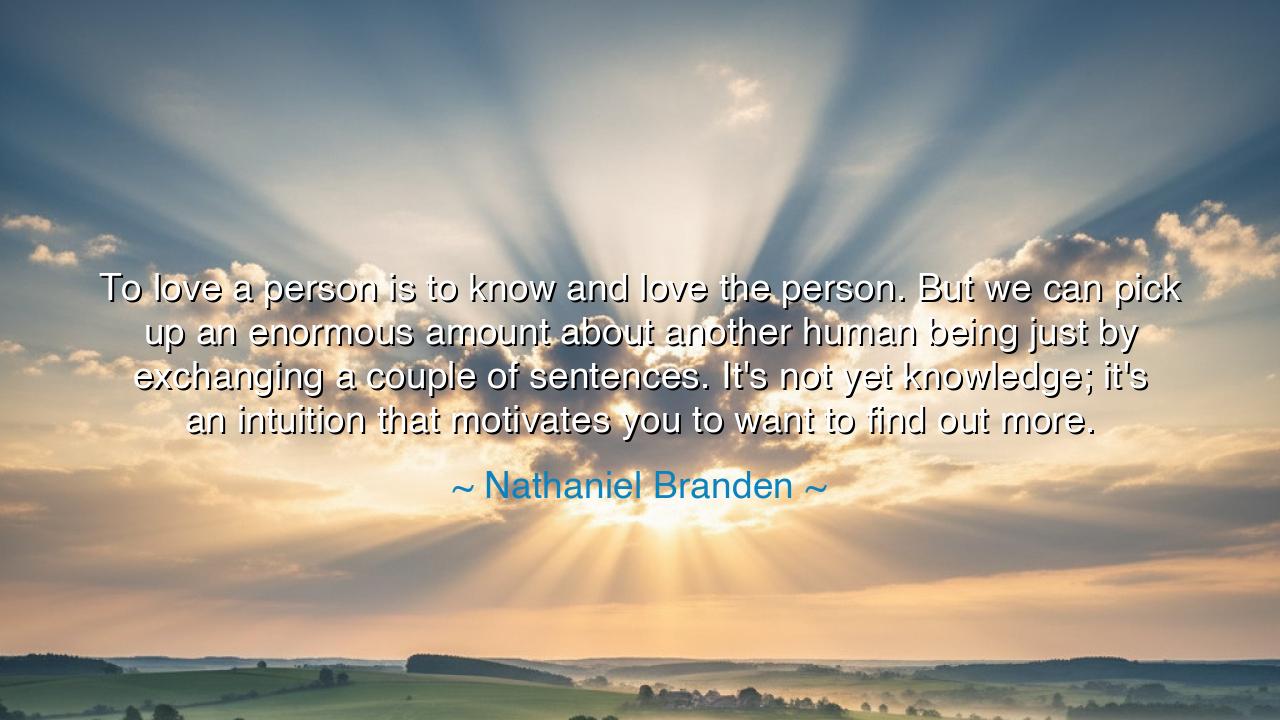
To love a person is to know and love the person. But we can pick
To love a person is to know and love the person. But we can pick up an enormous amount about another human being just by exchanging a couple of sentences. It's not yet knowledge; it's an intuition that motivates you to want to find out more.






Hear now the words of Nathaniel Branden, thinker and seeker of truth, who declared: “To love a person is to know and love the person. But we can pick up an enormous amount about another human being just by exchanging a couple of sentences. It's not yet knowledge; it's an intuition that motivates you to want to find out more.” This teaching speaks to the mystery of human connection, to the spark that leaps between souls, urging them toward understanding. It reminds us that love is not born whole in an instant, but begins with a glimmer, an intuition, and grows into fullness through the labor of truly knowing the other.
Branden, a psychologist of the twentieth century, spoke often of the human hunger for intimacy and authenticity. He understood that love cannot be mere sentiment or fantasy; it must be rooted in the reality of who a person is. Yet he also saw that before knowledge comes intuition—that subtle recognition in a word, a glance, a tone of voice, which whispers to the heart: “Here is someone worth knowing.” Such moments are not yet love, but they are its beginnings, the seed from which love may grow.
Consider, O listener, the meeting of Antony and Cleopatra as told by the ancients. At their first encounter, it was not deep knowledge that bound them, but the dazzling intuition of possibility—the sense of mystery, beauty, and power in the other. That spark led them to seek, to pursue, to uncover each other more fully. Though their story ended in tragedy, it illustrates Branden’s point: that human hearts are often moved first by intuition, and only later by the deeper work of truly knowing and loving.
Or recall the story of Helen Keller and Anne Sullivan. When teacher and pupil first met, there was no full knowledge between them, for Helen, trapped in silence and darkness, could not yet communicate. Yet Anne’s intuition told her that within this child lay brilliance and strength. That intuition compelled her to devote herself to the work of unlocking Helen’s mind. In time, their bond became one of profound love—a union born not only of affection, but of deep knowledge of one another’s spirit.
Thus Branden’s words reveal a path: true love is not blind, but seeing; not shallow, but deep. Infatuation may be born of the first glance or the first words exchanged, but it is only through the effort of understanding—through listening, learning, and embracing the whole person—that love becomes real. Intuition is the call; knowledge is the journey; love is the destination.
The lesson for us is this: do not mistake fleeting attraction for true love, but honor it as a beginning. When you feel that spark, let it move you to seek further, to learn who the other truly is—their strengths, their wounds, their dreams, and their fears. To love is to desire not only closeness, but truth, to embrace not illusions, but the living soul of another.
Practical actions are close at hand. When you meet another, listen not only with ears but with heart. Allow yourself to sense the subtle signals of intuition, but do not stop there. Ask questions, share time, seek to know. If you would love your partner, your friend, your child—labor to understand them as they are, not as you imagine them to be. For in the union of knowledge and love lies the fullness of human connection.
So let Branden’s teaching be engraved within you: intuition awakens desire, but only knowledge makes love real. And love, once rooted in truth, becomes a power that sustains, heals, and ennobles the human spirit. Follow this path, and you will not only find love, but learn how to live it fully, as one of the highest callings of mankind.






AAdministratorAdministrator
Welcome, honored guests. Please leave a comment, we will respond soon